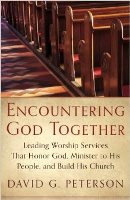David Peterson is emeritus professor at Moore Theological College in Sydney, Australia. He has written before on the subject of worship in his influential Engaging with God: A Biblical Theology of Worship (IVP, 2002). In his new book, Encountering God Together he turns his attention specifically to the worship services in local churches today, which he is here to talk about with us today.
Books At a Glance (Fred Zaspel):
First, tell us something about yourself and your background in the church. Do you write as one who has been involved in leading worship services in the church or one who has observed from the pew?
Peterson:
I have been a church pastor and Sunday assistant in many places, as well as the leader of a theological college. So preparing and leading services has been an ongoing part of my ministry. I have taught courses on Christian Worship at Moore College in Sydney and Oak Hill College in London, in addition to teaching New Testament exegesis and theology. Of course, I have also regularly observed many services from the pew. Part of the reason for writing Encountering God Together was a feeling of dissatisfaction with much that I have experienced.
Books At a Glance:
How has your larger and earlier work, Engaging with God, helped or informed this new book on the corporate worship services of the church? And how might it be helpful for us to read that book before this one?
Peterson:
The larger book was an attempt to show how worship is central to the message of the Bible, how the theme develops from Genesis to Revelation as the plan of God unfolds, and how it is linked with all the other great themes of Scripture. The New Testament shows how the pattern of worship God ordained for Israel has been fulfilled in the person and work of the Lord Jesus Christ. So New Covenant worship is essentially responding to Jesus and the gospel as God requires in every aspect of our lives. Readers would benefit from getting that whole-Bible perspective from Engaging with God, before focusing on the way we worship God when we gather together as his people. But the essence of that earlier book is contained in the first three chapters of Encountering God Together.
Books At a Glance:
Tell us your thoughts the designation “worship service” for our corporate meetings. Do you think that is the best designation for our corporate meetings? If you could, would you change the terminology to something else? What is the leading purpose of the gathered church? And while we’re at it, what about the titles “worship team” and “worship leader”?
Peterson:
I am uncomfortable about using the word ‘worship’ in the restricted way many do to describe church services and those who lead them. We diminish the significance of worship as a biblical theme when we employ the terminology in this exclusive way, sometimes simply equating worship with praise and singing. There is another way of viewing our gatherings in the New Testament that is rarely considered, namely edification. We meet together to take our part in the edification or building of Christ’s church, and in this way to encourage God-honouring worship in the gathering and in everyday life.
Books At a Glance:
What should be uppermost in our minds as we think of our meetings together? What are the leading considerations or themes that should shape the attention and focus of our corporate worship?
Peterson:
In simple terms, we could begin with Colossians 3:16 and say that the primary reason for meeting together is to let ‘the word of Christ’ (the gospel) dwell among us richly. In other words, we come together to meet with God and to have him minister to us through his word. Paul expands in various contexts and tells us that this happens as we minister to one another in activities such as teaching, singing and praying. So there should be a three-way movement to our gatherings: God ministers to us as we minister to one another and, in the process, we also respond to God. How we structure and lead our meetings is critical for this interplay between the ‘vertical’ and the ‘horizontal’.
Books At a Glance:
Broadly speaking, do you see any common strengths in the way Christians do church today? Perhaps some encouraging trends?
Peterson:
I am afraid that I find little encouragement in the way many ‘do church’ today. At one extreme, there is the unthinking formalism that allows for little congregational participation. At the other extreme, there is the unstructured informality that encourages participation, but often lacks depth and meaning. Finding a well-considered blend of the formal and the informal, the prepared and the spontaneous is rare. I don’t think we are talking to one another helpfully enough across the different traditions about how we might improve what we are doing.
Books At a Glance:
Painting still with a broad brush, what are some leading failures or weaknesses in church services today? Anything that tends to hinder or detract from our reason for meeting?
Peterson:
In the book I focus on particular areas such as preaching and teaching, praying and singing, but there are more fundamental issues with which I begin, relating to the biblical theology of worship and edification. Those who plan and lead services need to think more biblically and theologically about what they are doing. Scripture can even guide us about the content and structure of our meetings.
Books At a Glance:
Since we’re on dangerous topics, talk to us about music in the church. It’s been such a divisive issue over the last generation or so. Do you have any observations you can share on this score (no pun intended!)?
Peterson:
The problem with music is that we all have very personal tastes and experiences. This is true in the secular sphere as well as in our churches. So there is a need for musicians and service leaders to be sensitive to the musical values and expectations of particular groups in the church. At the same time, because of biblical exhortations to love and care for one another, we need to be more generous in accepting one another and appreciating different musical tastes. This requires good teaching from pastors about the way we handle differences of opinion, introduce new music and achieve an appropriate blend of style and content in our services.
Books At a Glance:
Just what is the value and role of music in the corporate meeting?
Peterson:
Music enables us to express our beliefs, our prayers and praises, and our hopes in memorable ways together. Singing about what God has said and done for us has the potential to unite us in love for God and for one another. If music is appropriately chosen and played, it can help us focus on biblical truth and respond with emotion and conviction.
Books At a Glance:
If you could set up a model worship service for all churches to follow, would you? Or perhaps better, what are the essentials of the corporate meeting? Or perhaps better still, just what were you hoping to accomplish in your new book on congregational worship services?
Peterson:
You could set up several models based on different biblical patterns and I have touched on this in the book. Different New Testament letters give us guidance about the way God wants us to reflect on what he has done for us in Christ and respond appropriately. Once you have decided on the essential elements of any God-honouring service, you could be looking for ways to combine these elements effectively. But you also need to take account of variables such as the theme of the sermon and the time of the year (e.g. Christmas, Easter or other special occasions). There should be some flexibility and room for creativity, so that the theme of the day is given full expression in readings, prayers, songs, teaching and various other responses.
Buy the books

Encountering God Together: Leading Worship Services That Honor God, Minister To His People, And Build His Church, by David G. Peterson

